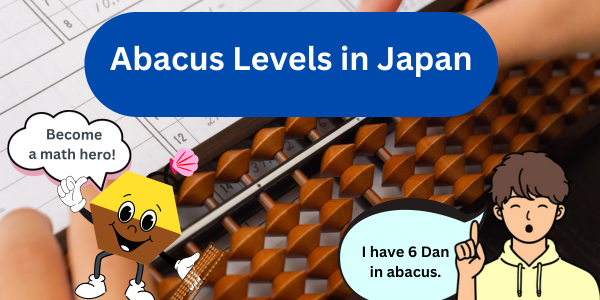There are several abacus organizations in Japan. Among them, Nihon Shuzan Renmei (Nishuren) and Zenkoku Shuzan Kyoiku Renmei (Zenshuren) are the main ones. They conduct certification exams for the abacus, mental calculation, computer mental calculation, and more.
In Japan, abacus certification exams are structured by levels, starting from 10 or 15 Kyu and progressing to the Dan levels. Here’s a quick breakdown of what each level involves:
- 10-15 Kyu: Emphasizes basic addition and subtraction skills.
- 9 Kyu: Introduces multiplication alongside addition and subtraction.
- 8 Kyu: Introduces division alongside addition, subtraction, and multiplication.
- 7 Kyu and above: Introduces mental calculation, progressing through increasingly complex operations with larger numbers and decimals.
- Dan Level: More complex operations with speed and accuracy. Covers advanced topics such as square roots, applied calculation methods, and mental calculations.
As you advance through the Kyu levels, the calculations become more numerous, the numbers get larger or smaller (including decimals), and the problems become more complicated. When you reach the Dan levels, you can expect even more complex numbers, which may include square roots, denpyo-zan (receipt-based calculations), applied calculations, and mental calculations. These higher levels require much faster speed and greater accuracy.
In Japan, many children begin learning the abacus just before or after entering elementary school, with the goal of reaching the 1 Kyu level by the time they finish elementary school, typically around age 11 or 12. As they advance through the levels, they require more practice time. However, for those preparing for junior high entrance exams, finding enough time for abacus practice can be challenging.
Passing an abacus certification exam, especially at Level 3 or above, is highly valued in Japan. It demonstrates strong calculation skills and can be included in applications for high schools and universities, as well as on resumes for job hunting. This certification is recognized as a credible qualification.
In my experience, it took me 2 years and 2 months to pass the 1 Kyu level, which is one level above the basic 1 Kyu. I was highly motivated to pass as quickly as possible, and each successful exam was rewarded with a Lego set from my parents, which served as a great incentive. I attended abacus school twice a week for sessions lasting 2 hours or more, and I practiced at home for an hour each day. Additionally, participating in various competitions helped me develop speed and accuracy, further fueling my motivation. Once I reached the Dan level, I shifted my focus to Mental Calculation, which proved to be invaluable for higher-level math.
While abacus certifications are highly valued in Japan, you may not find them as useful in the US. However, it’s totally okay not to take exams or participate in competitions as long as you have good materials, a knowledgeable instructor, regular practice, and parental support. The more you practice and improve your abacus skills, the more you will develop mental calculation abilities along the way. Most parents are interested in developing their children’s arithmetic skills to excel in math, and children enjoy math and gain confidence in the process.




